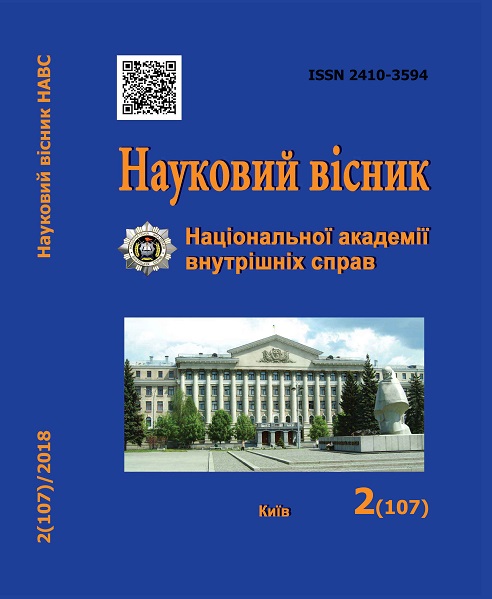Ways to Improve the Legal Regulation of Socio-Psychological Adaptation of Internal Trafficked Persons
Abstract
The article provides an analysis of the problem of socio-psychological adaptation and examines its features in the context of forced relocation of people as a result of events in eastern Ukraine. A modern understanding of who is internally displaced and the features of these individuals in our society is presented. The objective and subjective reasons for their adaptation, as well as the problems that arise in the process of social and psychological adaptation of internally displaced persons and the need to provide them with social and psychological support are determined. According to the modern interpretation, internally displaced persons (IDPs) are people who are forced to leave their places of permanent residence suddenly as a result of armed conflict, internal hostility, systematic violations of human rights or natural disasters, but nevertheless did not leave the territory of their country, that is not crossed the internationally recognized state border. The military conflict that continues in the east of Ukraine caused a significant number of people to leave their places of residence, migrate to someone elseʼs environment, adversely affect their physical and psychological state, they have problems with adaptation, their quality of life deteriorates. The solution of the problems of internally displaced persons is conditioned by the need to find, as soon as possible, ways to solve the many-sided tasks that are facing the society today and to stabilize the situation that has arisen. Forcibly displaced persons are integrated into a new socio-cultural environment with a complex image of social reality and themselves in it. The extent to which social and psychological adaptation will be successful depends both on the characteristics of these individuals, and on the extent to which the new social environment has a willingness to perceive such a person. Socio-psychological adaptation of internally displaced persons is the process of integration into the system of social and psychological ties and relations arising in the new social environment of their life activity. Adaptation of such persons is considered as the process of entering a person into a certain group, assimilating norms, relationships and determining the place in the structure of relations between members of the group. Features of socio-psychological adaptation of internally displaced persons are due to the experience of psychological trauma, formed on this soil by social attitudes. The definition of psychological problems that arise in individuals with such a special status in the course of their adaptation, as well as the study of the socio-psychological factors of the subjective well-being of internally displaced persons, the disclosure of their communicative interactive nature is a prerequisite for improving the socio-psychological work with the persons of this group to improve level of their subjective well-being and quality of life.
Downloads
Abstract views: 132 PDF Downloads: 46
- Authors reserve the right to authorship of their own work and transfer to the magazine the right of the first publication of this work under the terms of the Creative Commons Attribution License, which allows other persons to freely distribute published work with mandatory reference to authors of the original work and the first publication of an article in this magazine.
- Authors have the right to enter into separate additional agreements on non-exclusive dissemination of the work in the form in which it was published in the journal (for example, to post an article in the institution's repository or to publish as part of a monograph), provided that the link to the first publication of the work in this journal is maintained.
- The journal's policy allows and encourages the posting of articles by authors on the Internet (for example, in electronic storehouses of institutions or on personal websites), both before the submission of this manuscript to the editorial office and during its editorial processing, as this contributes to the creation of a productive scientific discussion and positively affects the efficiency and dynamics of citing the published work.




